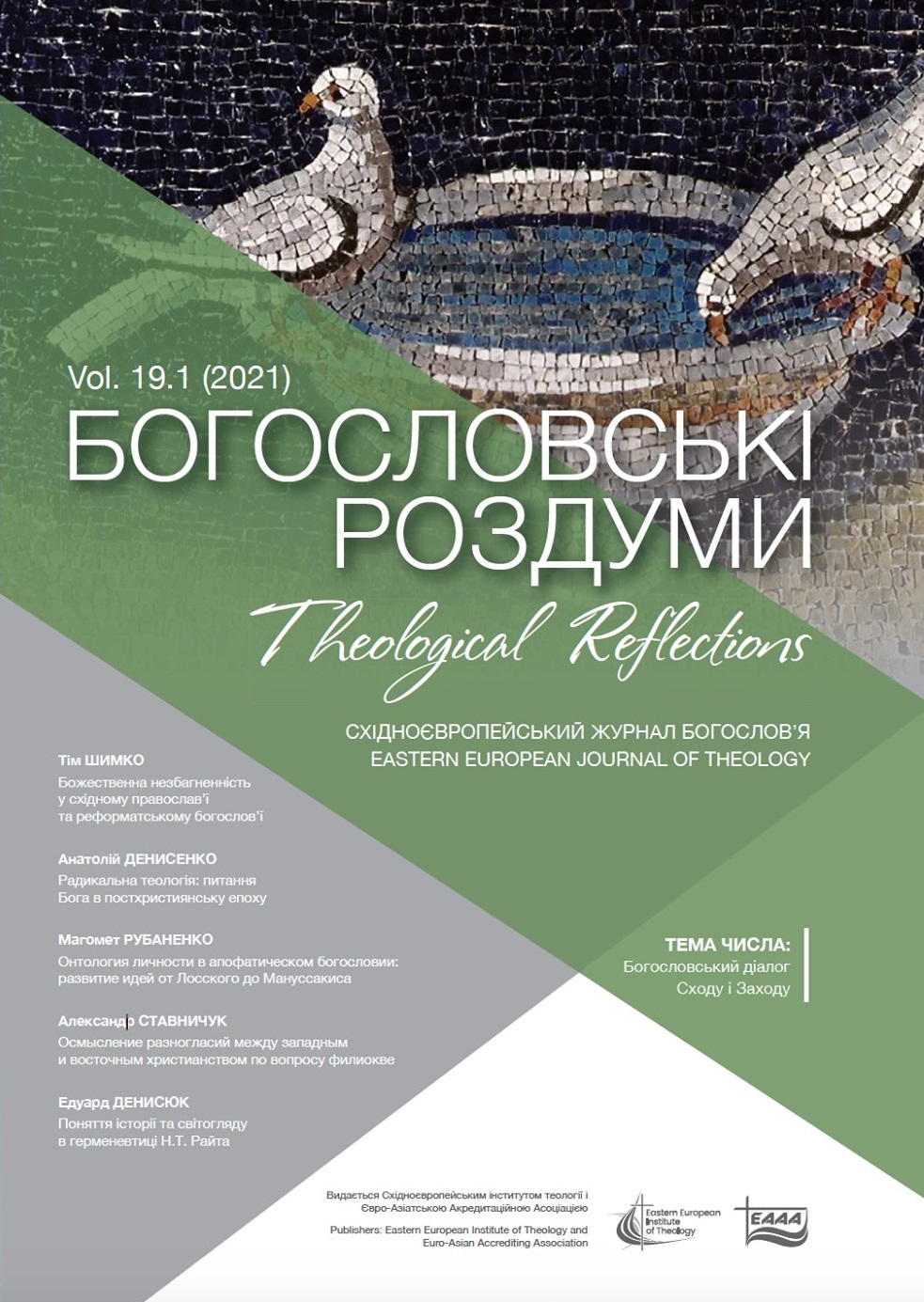Divine Incomprehensibility in Eastern Orthodoxy and Reformed Theology
DOI:
https://doi.org/10.29357/2521-179X.2021.v19.1.1Keywords:
Eastern Orthodoxy, Reformed theology, divine incomprehensibility, theosis, archetypal/ectypalAbstract
This article examines the views of the Eastern Orthodox and the Reformed on the subject of divine incomprehensibility. The two regard God to be entirely incomprehensible, but differ in the way that he can be known or experienced. The Eastern Orthodox maintain that God is not ultimately known intellectually but experienced mystically. Mystical experience, according to this view, is theology par excellence. The key means by which this mystical experience is enjoyed is theosis, or deification. The Reformed, on the other hand, eschew mystical experience and instead focus on the archetypal/ectypal distinction. God cannot be known as he is in himself (archetypal theology), but as he reveals himself to his creation (ectypal theology). Ectypal theology is not identical to, nor intersects at any point with, archetypal theology. It is, instead, analogous to it. With these different views on divine incomprehensibility, this article also briefly considers how these views affect other areas of study in theology (such as anthropology, hamartiology, soteriology, and pneumatology).
References
- REFERENCES
- Bavinck, H. Reformed Dogmatics. Translated by John Vriend. 4 volumes. Netherlands, 1895–1901; Grand Rapids: Baker Academic, 2004.
- Begzos, M. P. “Apophaticism in the Theology of the Eastern Church: The Modern Critical Function of a Traditional Theory,” The Greek Orthodox Theological Review 41 (1996): 327-357.
- Berkhof, L. Systematic Theology. London: Banner of Truth, 1941.
- Bradshaw, D. “Essence and Energies: What Kind of Distinction,” The Pemptousia Journal for Theological Studies 6 (2019): 5-35.
- Calvin, J. Institutes of the Christian Religion. Translated by Henry Beveridge. Geneva, 1545; Peabody: Hendrickson, 2008.
- Chryssavgis, J. “The Origins of the Essence-Energies Distinction,” Phronema 5 (1990): 15-31.
- Demetrios Harper, “Becoming Homotheos: St. Gregory Palamas’ Eschatology of Body,” in Athanasopoulos, Triune God: Incomprehensible but Knowable—The Philosophical and Theological Significance of St Gregory Palamas for Contemporary Philosophy and Theology. Newcastle: Cambridge Scholars Publishing, 2015.
- Horton, M. The Christian Faith. Grand Rapids: Zondervan, 2011.
- John of Damascus, Exposition of the Orthodox Faith. In vol. 9 of The Nicene and Post-Nicene Fathers, Series 2. Edited by Philip Schaff. 1886–1889. 14 vols. Repr. Peabody, Mass.: Hendrickson, 1994.
- Junius, F. A Treatise on True Theology. Translated by David C. Noe. Netherlands: 1594; Grand Rapids: Reformation Heritage Books, 2014.
- Lossky, V. The Mystical Theology of the Eastern Church. Crestwood: St. Vladimir’s Seminary Press, 1976.
- Muller, R. Post-Reformation Reformed Dogmatics, 4 vol. Grand Rapids: Baker, 2003.
- Nichols, A. Light from the East: Authors and Themes in Orthodox Theology. London: Sheed & Ward, 1995.
- Palamas, G. The Triads. Translated by John Meyendorff. Greece: 1341; Mahwah: Paulist Press, 1983.
- Turretin, F. Institutes of Elenctic Theology. Translated by George M. Giger. 3 volumes. Geneva, 1687–90; Phillipsburg: P&R Publishing, 1992.
- Yannaras, C. Elements of Faith: An Introduction to Orthodox Theology. Edinburgh: T&T Clark, 1991.
Downloads
Published
How to Cite
Issue
Section
License
Copyright (c) 2021 Tim Shimko

This work is licensed under a Creative Commons Attribution-NonCommercial 4.0 International License.
All articles published in the Journal are distributed under a Creative Commons Attribution-NonCommercial 4.0 International License
By submitting an article for publication in Theological Reflections: Eastern European Journal of Theology the author grants the editors the right to publish the article and distribute it in electronic and print form.
The author reserves all copyrights and the right to use the materials of the article in whole or in part for educational purposes, to write his own dissertations, to prepare abstracts, conference reports, oral presentations, etc., as well as post electronic copies of articles (including the final electronic version downloaded from the journal’s official website) on non-commercial web-resources without the consent of the editorial board and founders.



